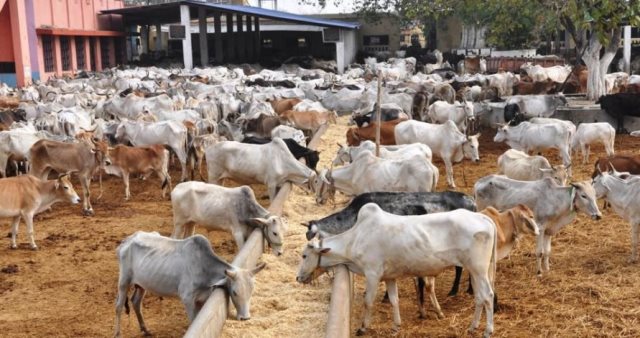The central characters in the arc of the anti-grazing bill drama that has held a tense political atmosphere between southern and northern leaders are the herders and farmers, with the former sparking the tension further through growing acts of violence meted on the latter.
Nigeria’s security fiber is challenged by internal forces that are yet to come under the boots of the country’s armed forces, a hope that remains so, despite years-long efforts to crush the perpetrators.
And rising by the day, through brutal attacks on farmers and forcibly seizing their properties, are nomads with their herds trooping from the dry ends of northern Nigeria to its temperate south.
The attacks precipitated the enactment of the anti-grazing bill in states, mostly in the south, and two states in the north, Taraba (northeast) and Benue (north central), to curtail the degree of violent attacks in these states.
Perceived as an objective solution to the existential crisis, leaders from the north have criticised the move, tagging it as divisive, restricting the movement of nomads across the country, veering off from the thrumming** tune of ‘one Nigeria’ saturating the political space.
The presence and activities of the herders pose a threat to the country’s food security, as many farmers have, out of fear of being killed, avoided their farmlands, frustrating the Federal Government’s plan to increase the country’s agricultural output and supply.
The responses of the Federal Government to the situation have fallen short of expectations, among which was the controversial ranching initiative, the National Livestock Transformation Plan (NLTP), a 10-year plan introduced to contain the crisis.
With the NLTP programme, the government planned a ranching system for herders, with the hope of growing the ranches to 119 across participating states, thereby reducing friction.
However, this plan was not quickly embraced by leaders in the south who, from reports emerging from states in the Northeast and the Middle Belt, and from local farmer-herder stories, resolved that the anti-grazing bill would be an appropriate response to the problem.
This resolution reverberated across the south but leaders in the core north pushed back, with the Governor of Kaduna State, Nasir El-Rufai, telling southern leaders that the anti-grazing bill was not implementable.
Farmer-Herder Crisis: Brief Background
For a better understanding of the tumor that is the herders’ attacks on sedentary farmers in the country, let us go back in time to where it all began.
Herders and farmers have, for decades, had socio-economic interactions, exchanging goods and services under a cloud of understanding and harmony.
During this era, farmers and herders had a mutually satisfying agreement, that was overseen by an appointed leader called Ruga – an arrangement conceived in the pre-colonial era.
The Ruga, elected by some Fulani groups, was charged with the responsibilities of crisis management within Fulani groups, and the regulation of grazing activities within his group, choosing suitable grazing and migratory areas, the Building Blocks for Peace Foundation notes.
However, a shift brought about by the colonial masters changed the game, and things went southwards from thereon. The foreigners introduced new systems that changed the landscape of extant cooperations between farmers and herders in Nigeria’s north.
These alterations included the ownership of land – which saw a majority resting in the possession of the Europeans – and the conflict resolution approach which was foreign to the locals who already had their set methods.
The new landowners made it difficult for locals – farmers and herders alike – to gain access to lands, causing a scarcity of resources.
As the years have rolled by, more and more factors have caused these herders have become more desperate in their search for grazing routes.
And this desperation comes with unprecedented violence, one never documented before in the history of farmers-herders relationship throughout the country’s history.
Over 10,000 people have been killed as a result of the crisis from 2016 till date, displacing some 300,000 more, according to data from the International Crisis Group.
And states have lost $2.3 million of their internally generated revenue (IGR) to the farmers-herders crisis, Assessment Capacities Project Thematic Report (ACAPS) showed.
States Enacting the Anti-Grazing Bill
Taking proactive steps to curb, or avoid, such febrile acts of violence from proliferating any further, some states resolved to enact the anti-grazing law. A contentious law.
Some states enacted the law earlier than others, however, its enforcement remains to be seen, as herders have been observed to continue with their activities, untouched.
A report by The Guardian showed that police forces have distanced themselves from enforcing the law, as the order to do so, from the command chain, was yet to be transmitted.
A source – at the Force Headquarters, Abuja, the nation’s capital – who spoke to The Guardian, said that police officers walked on eggshells around the subject.
This hasn’t stopped states in their determination to introduce the anti-grazing law in their respective states, amid the silence from the Federal Government on its enforcement.
READ ALSO: Financial Expert Faults Osinbajo’s Call For CBN To Allow Naira Reflect Realities Of Market
What states have enacted the law?
In May 2021, governors of southern states convened in Asaba, Delta State capital, reaching a consensus to enforce the anti-grazing law across the region.
Reading the resolution of the governors at the meeting of the Southern Governors Forum (SGF), its Chairman, Rotimi Akeredolu, said that the law was necessitated by the “incursion of armed herders” into the region.
“The forum observed that the incursion of armed herders, criminals, and bandits in the southern part of the country has created a severe security challenge, such that citizens are not able to live their normal lives, including pursuing various productive activities, leading to threats of food supply and general security. Consequently, the meeting resolved that open grazing of cattle be banned across southern Nigeria,” Akeredolu said.
The governors set September 1 as the deadline for the passage of the law, however, as earlier mentioned, its implementation is yet to be seen, seeing as state governments have limited powers.
Ekiti, Bayelsa, Abia, Oyo, and Ebonyi states led the charge in institutionalising the anti-grazing bill, ahead of the meeting of the 17 southern governors in Delta State.
Other states that have passed the law include Akwa Ibom, Lagos, Ogun, Cross River, Enugu, Delta, Osun.
Others are Bayelsa, Rivers, and Ondo states; leaving Edo, Anambra, and Cross River states. The latter has a bill that has been passed in its state house of assembly since 2017, awaiting the assent of its governor, Ben Ayade.
While, in the northern region, only Benue and Taraba states have signed the bill into law.
In Benue State, between February 2013 and May 13, 2017, attacks carried out by armed herdsmen were 46, which resulted in the deaths of more than 1,500 indigents across 15 local government areas of its 23 local government areas; destroying farmlands and properties.
Pegging the cost of damaged properties in the state at N400 billion was the Benue State Attorney General and Commissioner for Justice, Mike Gusa.
The law in the state was signed by its Governor, Samuel Ortom, on 22 May 2017, but went into full effect on November 1.
Responding to the passing of the law in Ondo state, in a statement; the Miyetti Allah Cattle Breeders Association of Nigeria (MACBAN) – the umbrella body of Fulani nomadic herders headquartered in Kaduna, northern Nigeria – took a swipe at the Benue State government.
It questioned the success of the passage of the bill in Benue State, in its aim of curbing the violence poking holes in the state’s security framework, masterminded by herdsmen.
The group said, “So, we will wait and see how this law is going to be implemented … Go and appraise the Benue law, has it succeeded in bringing peace to Benue? It has never succeeded in bringing peace to Benue. Rather, it has further aggravated the situation to becoming worse, day in, day out.”
Another Fulani herder group, Miyetti Allah Kautal Hore, often conflated with MACBAN, expressed disapproval with the laws, describing it as “satanic”.
The group, in an interview with The PUNCH, vowed to sue southern states that have enacted the law, noting that the right to sue rested with “Nigerians whose rights are violated”.
In the meantime, the Federal Government is yet to take any substantive stance on the subject, however, the body language of the government shows an unwillingness to support state governments in the enforcement of the anti-grazing law.
The Attorney-General of the Federation and Minister of Justice, while appearing on Channels Television’s Politics Today programme argued that the herders had every right, as enshrined in the constitution, to move freely.
He posited that until there’s an overhaul of that constitutional right, “it is a very dangerous position for any governor in Nigeria to think that he can bring about any compromise on the freedom and liberty of individuals to move around.”
Stressing further, the minister drew a parallel between activities of herdsmen in the south and southern “spare parts” traders in the north – drawing the ire of many Nigerians – who poked holes in the analogy; stating that the spare parts traders in the north were conducting their businesses without causing a menace.
The President of the Igbo socio-cultural group, Ohanaeze Ndigbo, Professor George Obiozor, described the words of the minister as “thoughtless, insidious and prejudicial.”
Adding to Obiozor’s thoughts on Malami’s view, Rotimi Akeredolu of Ondo State dressed the comment as “disconcerting”, stating that it was “most unfortunate that the AGF is unable to distill issues as expected of a senior advocate.”











